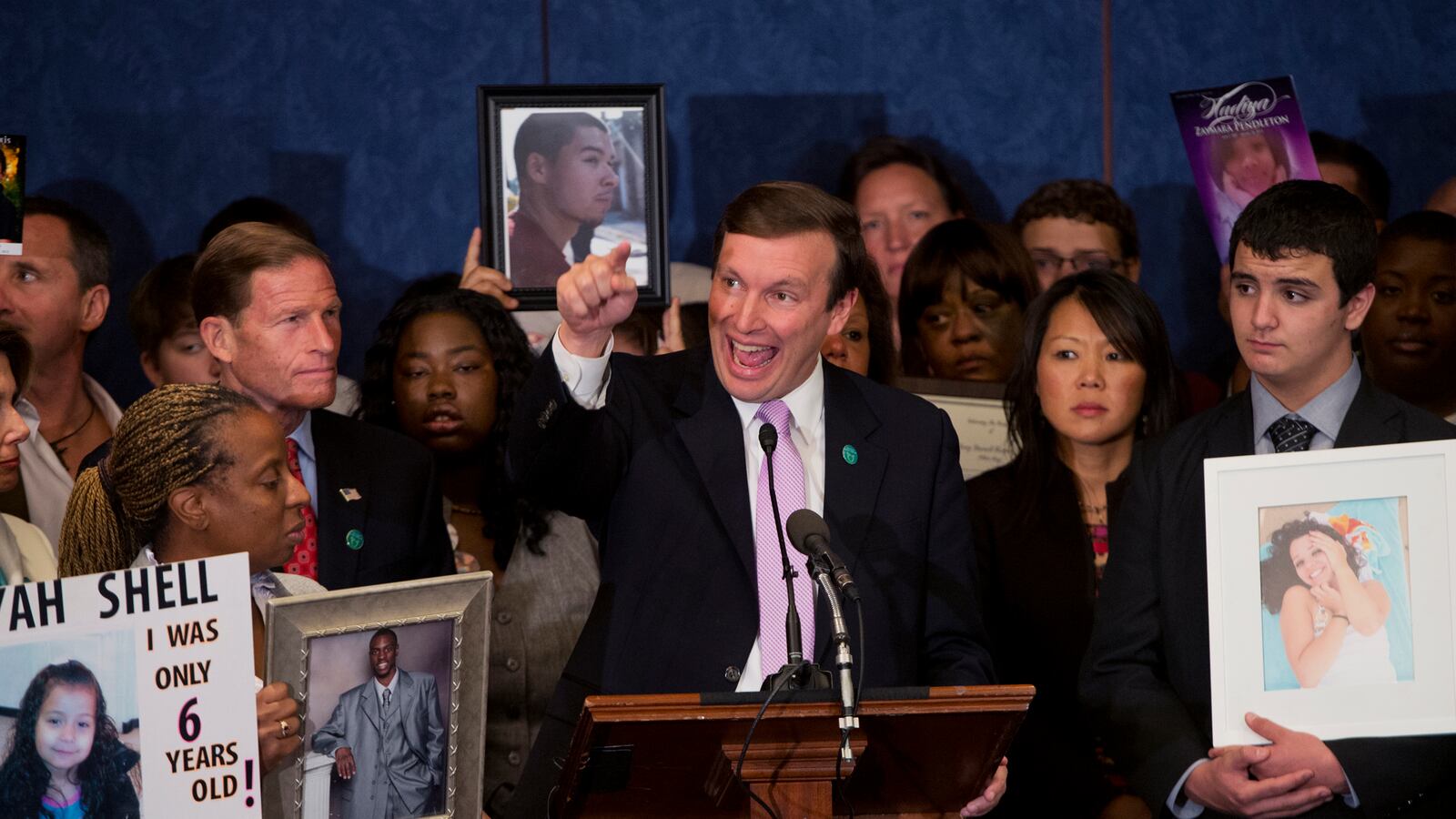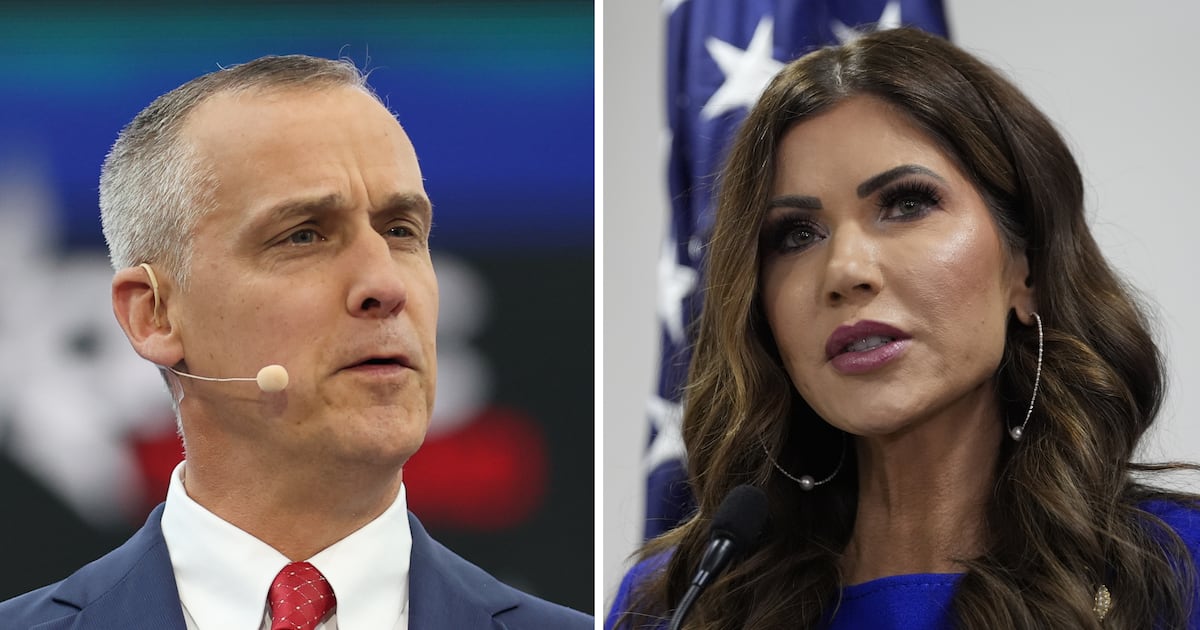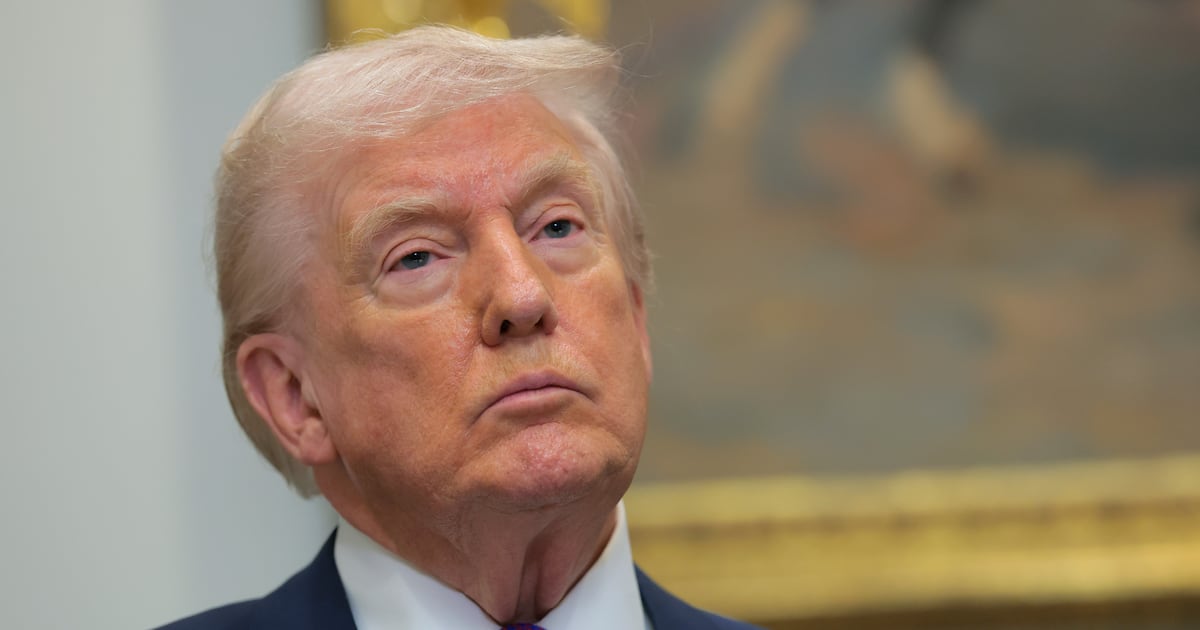On December 14, 2012, Chris Murphy, then still a congressman representing a mostly suburban Connecticut district, was at the Bridgeport City Hall for a press conference on renewable energy. It was the holiday season, and he was planning to take the rest of the afternoon off and take the train to New York with his wife and two kids.

On Murphy’s walk from the train station, an aide with him had begun to hear the first reports about a shooting at an elementary school in Newtown, a small community 20 miles north on the edge of his district. It seemed at first like just some kind of workplace dispute, so the plan was still to get on the train and see the tree at Rockefeller Center.
They soon learned that what was unfolding was much, much worse. Murphy told his kids, then 4 and 1, that they wouldn’t be going to New York. They started crying and complaining, and the congressman rushed off to Newtown. He was there when Gov. Dan Malloy told the parents of children at Sandy Hook Elementary School gathered at a nearby firehouse that “the person they were waiting for was not going to return.”
Murphy had just come out of a tough campaign for a U.S. Senate seat against former wrestling executive Linda McMahon, who spent $40 million in an effort to defeat him. Murphy had received F ratings from the National Rifle Association during his three terms in Congress but hadn’t paid much attention to gun issues, spending more of his time on issues that mattered to his small-town district—open space initiatives, manufacturing, renewable energy.
At 39, he was about to become the youngest person serving in the U.S. Senate. And instead of a day off with his family, he was at the center of one of the most horrific tragedies ever to unfold on American soil.
“My Senate career changed on December 14,” he says now. “My priorities were fundamentally different on December 15 than they were the day before.”
Nearly a year after the shootings in Newtown, Murphy was again in Bridgeport City Hall, on a dreary Thursday. He was there this time for a press conference on a bill banning plastic guns, which the House had passed but which Democrats feared had too many loopholes, especially in the days of 3-D printing technology.
“It is not without notice,” he told the handful of Connecticut media assembled in a city hall conference room, “that we are going to be voting on this bill just days before the anniversary of the shooting at Sandy Hook.”
He swallowed, as if embarrassed for a moment.
“It’s true, a lot of us wish we were voting on more substantial legislation.”
Every politician in Connecticut has some connection to the Sandy Hook shooting, but Murphy’s is different from most. He is, he notes, the same age as many of the parents whose children were killed there. His kids are roughly the same age as theirs are, or were. He flew with the Newtown families to Washington to lobby for a gun control bill that advocates thought was weak but which still couldn’t overcome a Republican filibuster in the Senate. He still keeps in touch with many of them.
Speaking now, a year after the shooting, Murphy still sounds rattled, and he trembles with anger over Washington’s failure to do much to prevent another one.
The Republicans who have resisted new gun laws, are, he said, “gun control Darwinists.”
“They really believe that the best way to get guns out of the hands of criminals is to put guns into the hands of both good guys and bad guys, and just hope that the good guys shoot the bad guys,” he said. “That is the ethic behind Stand Your Ground laws. That is part of the resistance to background checks. There are a lot of people who do not want to pass new gun laws because they really do think that the free market will solve every problem, including the gun violence problem.”
The rest of the country, Republican and Democratic alike, is on his side, he said, pointing to polls that show vast majorities favor expanded background checks and limits on automatic weapons. Congress just needs to catch on, and to learn that the bark of the NRA is worse than its bite, he suggested.
“I think there is a complete misunderstanding of the power of the gun lobby,” he said. “I made this argument until I was blue in the face to my colleagues. I told them, ‘You are totally misreading the NRA’s power. They lost in 13 of the 16 Senate races they got involved in. They went after President Obama in state after state, and they lost in state after state. These guys are paper tigers.’”
Mark Glaze, executive director of Mayors Against Illegal Guns, said he was pleasantly surprised at how Murphy took on guns after the shooting, as he had not shown much interest in the issue before. He was the one made the case to fellow senators and to the public that the NRA was both becoming more extreme and more ineffectual politically. When the consensus seemed to be growing around a smaller bill, one that would just focus on the mental health side of the equation and not the firearms side, Murphy worked to keep Democrats together.
“There is always somebody who wants to take an easy vote that would allow them to go home and say, ‘I did my bit,’ but did not actually do anything to stop gun violence,” Glaze said. “Senator Murphy kept everybody’s eyes on the prize. He went directly after the wrongdoers in this situation, which was the NRA’s leadership in Washington.”
As he walked the corridors of the Senate in his first year, Murphy said he found two kinds of Republicans. He told the story of one GOPer who he thought was sympathetic to his cause. They started meeting but kept running into roadblocks.
“Eventually, he opened up to me and just said, ‘Look, I have to be honest here. I didn’t come here to write any laws. I came here to tear down laws.’ Laws! So he has sympathy for the gun issues, but his mission is to tear down government, even when it comes to existing firearms laws,” Murphy said.
The gun control Darwinists are even worse, he said. These lawmakers are in thrall “to an industry that has to build up paranoia in order to convince a handful of survivalists and constitutionalists to spend thousands and thousands of dollars on guns because they have convinced people that there are going to be black helicopters descending on your house to steal your guns,” he said.
New York City Mayor Mike Bloomberg has vowed to spend part of his fortune defeating politicians who will not stand up to the NRA. Democrats have only partially welcomed his efforts, as it means some of them will be picked for forced retirement as well. Murphy, however, seemed to suggest that even for members of his own party, the price was worth paying.
“I think there will be consequences on both sides of the aisle,” he said. “Look, it is a mistake for people to focus on the small handful of Democrats who voted for this, because 90 percent of Americans favor expanded background checks and 90 percent of Democrats voted for it. But I care so deeply about this issue that I understand there are going to be consequences for both my friends and my adversaries if they continue to sit on the sidelines.”
Now, he says, gun control advocates need to focus on building up an infrastructure as the NRA has done, one that makes guns a single issue and that people vote on.
“In the weeks and months after Sandy Hook, I was convinced that we were going to get a substantial gun bill passed through the Senate,” he said. “I have come to realize that this is a long game that involved building up the political operation on our side. That is just as significant. I am convinced that it will happen, but it will take years, not months.”
Murphy plans to be back in Newtown later this week for the anniversary of the shootings. He will attend a private ceremony with some family members. The town, he said, “is exhausted. I don’t think people realize how nuclear this was for this community and how the crisis unfolded like a peeling onion. When that number of kids is killed, the trauma extends to neighbors, to kids, to classmates, to the teachers. It is still very much a community in crisis. They just can’t go through a big public remembrance.”
Murphy was criticized while the gun bill was being debated for pushing the Sandy Hook families in front of cameras and using their grief for legislative ends. As the anniversary approaches and he heads back to Washington to wrap up his first year in the Senate, he said he will keep pushing the issue.
“I will be in Washington for two more weeks, and I will do everything within my power to shame my colleagues into taking another look at this issue,” he said. “I am not going to exploit the one-year mark, but it should serve as a source of tremendous embarrassment for members who knew what the right thing to do was. If the one-year anniversary sparks even a little bit of their conscience, I am happy to use the opportunity.”






